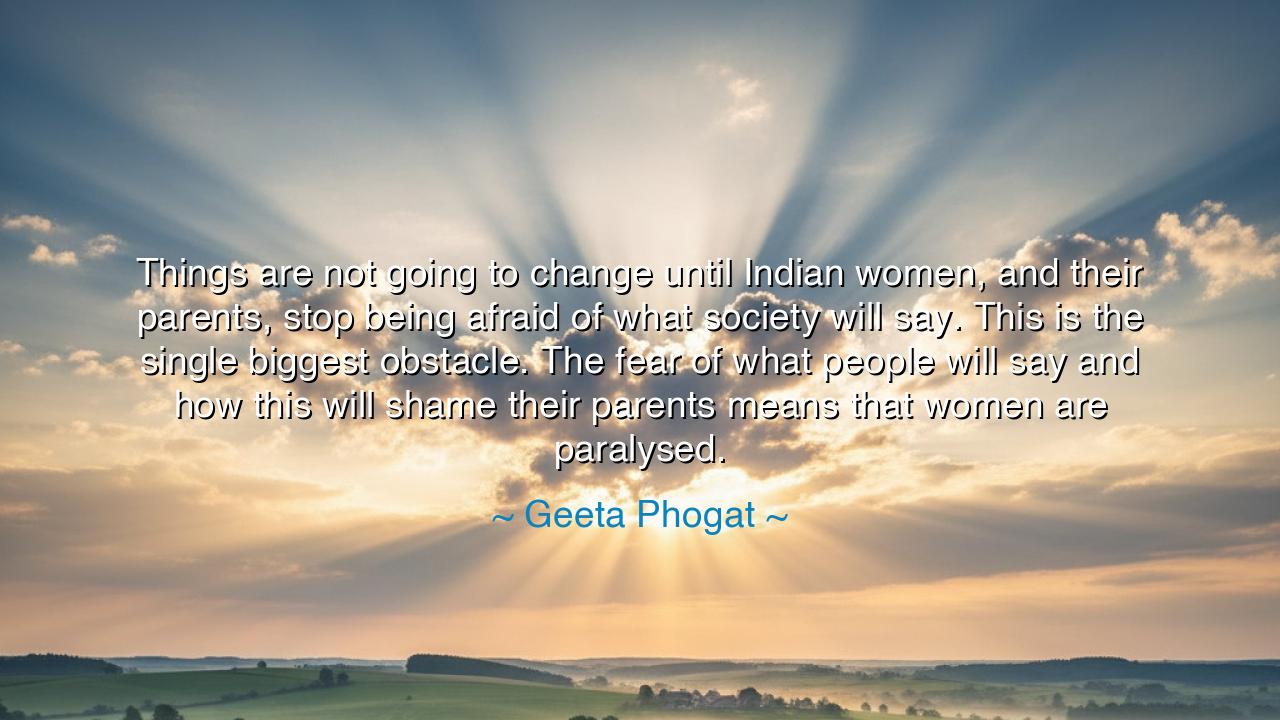
Things are not going to change until Indian women, and their
Things are not going to change until Indian women, and their parents, stop being afraid of what society will say. This is the single biggest obstacle. The fear of what people will say and how this will shame their parents means that women are paralysed.






Hear the fierce and unyielding words of Geeta Phogat, the wrestler who rose from the dusty akharas of Haryana to bring glory to her land: “Things are not going to change until Indian women, and their parents, stop being afraid of what society will say. This is the single biggest obstacle. The fear of what people will say and how this will shame their parents means that women are paralysed.” These words strike like a hammer upon the chains of custom, for they reveal that the greatest prison is not built of stone, but of fear—fear of judgment, fear of shame, fear of society’s cruel whispers.
The origin of this thought springs directly from Phogat’s own life. She was the first Indian woman to win a gold medal in wrestling at the Commonwealth Games, yet her journey began against a tide of scorn. In her village, people mocked her father for training his daughters in a sport reserved for men. Tongues wagged, elders frowned, and the weight of tradition pressed heavily upon her family. But her father chose courage over conformity, and Geeta herself chose ambition over paralysis. Out of this struggle comes her truth: that change cannot come until women and their families cast aside the terror of “what will people say.”
The ancients, too, understood this battle. In every age, the chains of custom have bound women’s voices, and in every age, heroines have broken them. Recall Joan of Arc, a peasant girl who defied both armies and the Church, led men into battle, and crowned a king. She, too, endured the whispers of society that mocked, shamed, and condemned her. Yet by standing firm, she proved that the judgment of people is fleeting, but the power of courage endures forever. So too do Phogat’s words remind us that progress belongs not to the fearful, but to the brave.
History in India itself offers witness. Think of Savitribai Phule, who in the 19th century dared to open schools for girls when such an act was seen as defiance of heaven itself. She endured being pelted with dung and stones, mocked daily for corrupting the order of society. Yet she did not falter. She carried an extra sari with her to wash away the humiliation and continued teaching. Today, she is honored as a pioneer of women’s education. Her life confirms the wisdom of Phogat’s words: that society will always speak, but those who yield to fear will remain shackled.
The meaning of this quote is therefore both a diagnosis and a summons. It diagnoses the fear of shame as the deadliest obstacle, more paralyzing than poverty, more suffocating than lack of opportunity. It summons women and parents alike to defy this fear, to place courage above gossip, dignity above approval. For when courage triumphs, society itself begins to change. Silence feeds oppression, but boldness breaks its grip.
What lesson, then, shall we take? That true freedom begins not in the outer world, but in the heart. Parents must refuse to measure their honor by the noise of others. Women must rise with the knowledge that their worth is not diminished by whispers. And communities must learn that the tongue which gossips is weaker than the hand that builds. To defeat this fear, families must stand together, shielding one another from the poison of judgment, and creating a culture where courage is honored more than conformity.
Therefore, children of the future, engrave this wisdom upon your hearts: fear of what people will say is the chain that binds, courage is the sword that cuts it. Do not be paralyzed by the shadows of gossip, but walk boldly in the light of your calling. Parents, stand by your daughters; daughters, walk with pride in your strength. For when one family defies fear, a village changes; when many villages change, a nation rises. And in this rising, the voices of women will no longer be silenced, but will echo like thunder across the generations.






AAdministratorAdministrator
Welcome, honored guests. Please leave a comment, we will respond soon